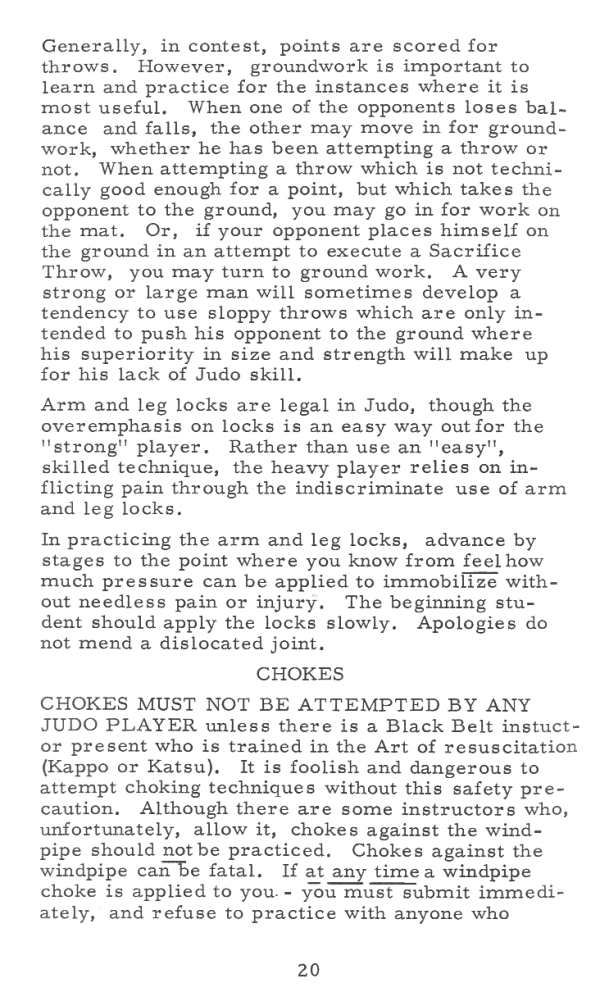13555 jff 020

Generally, in contest, points are scored for throws. However, groundwork is important to learn and practice for the instances where it is most useful. When one of the opponents loses bal-ance and falls, the other may move in for groundwork, whether he has been attempting a throw or not. When attempting a throw which is not techni-cally good enough for a point, but which takes the opponent to the ground, you may go in for work on the mat. Or, if your opponent places himself on the ground in an attempt to execute a Sacrifice Throw, you may turn to ground work. A very strong or large man will sometimes develop a tendency to use sloppy throws which are only in-tended to push his opponent to the ground where his superiority in size and strength will make up for his lack of Judo skill.
Arm and leg locks are legał in Judo, though the overemphasis on locks is an easy way out for the "strong" player. Rather than use an "easy", skilled techniąue, the heavy player relies on in-flicting pain through the indiscriminate use of arm and leg locks.
In practicing the arm and leg locks, advance by stages to the point where you know from feelhow much pressure can be applied to immobilize with-out needless pain or injury. The beginning student should apply the locks slowly. Apologies do not mend a dislocated joint.
CHOKES
CHOKES MUST NOT BE ATTEMPTED BY ANY JUDO PLAYER unless there is a Black Belt instuct-or present who is trained in the Art of resuscitation (Kappo or Katsu). It is foolish and dangerous to attempt choking techniąues without this safety pre-caution. Although there are some instructors who, unfortunately, allow it, chokes against the wind-pipe should not be practiced. Chokes against the windpipe caiTTSe fatal. If at any time a windpipe choke is applied to you- - you must submit immedi-ately, and refuse to practice with anyone who
20
Wyszukiwarka
Podobne podstrony:
93 (18) General Instructions Complele instructions are gmn for making each ol the projeds shown in i
Gordo Remora Next up on Gordo: Pecple who believe in conspiracy thecries. Are they nuts or just
img011 (41) LT>beyond the basics z Notę: Jogless stripes in the round are useful for many knittin
img011 (41) LT>beyond the basics z Notę: Jogless stripes in the round are useful for many knittin
Gordo Remora Next up on Gordo: Pecple who believe in conspiracy thecries. Are they nuts or just
img011 (41) LT>beyond the basics z Notę: Jogless stripes in the round are useful for many knittin
img011 (41) LT>beyond the basics z Notę: Jogless stripes in the round are useful for many knittin
Section B PreparationCo-ordination It is important to ensure that work activities, requiring permits
phological Map. This map is of a great scientific and practical value. It in-forms not merely of the
I am taking my bag. We are waiting for my uncle. He is looking at the stars. We are doing oiir homew
index5 General::spelll : Morę. Possible spelling error: new symbol narne "elear" is simila
107 X The United States is prepared to accept and act in accordance with the balances of interests r
Quilled furnitiire madę for an enchanting cottage. Very easy to make and with imagination many vari-
75732 mbs 060 MY BREATHING SYSTEM are widened. The completeness of inhalation is surę to be frustrat
więcej podobnych podstron